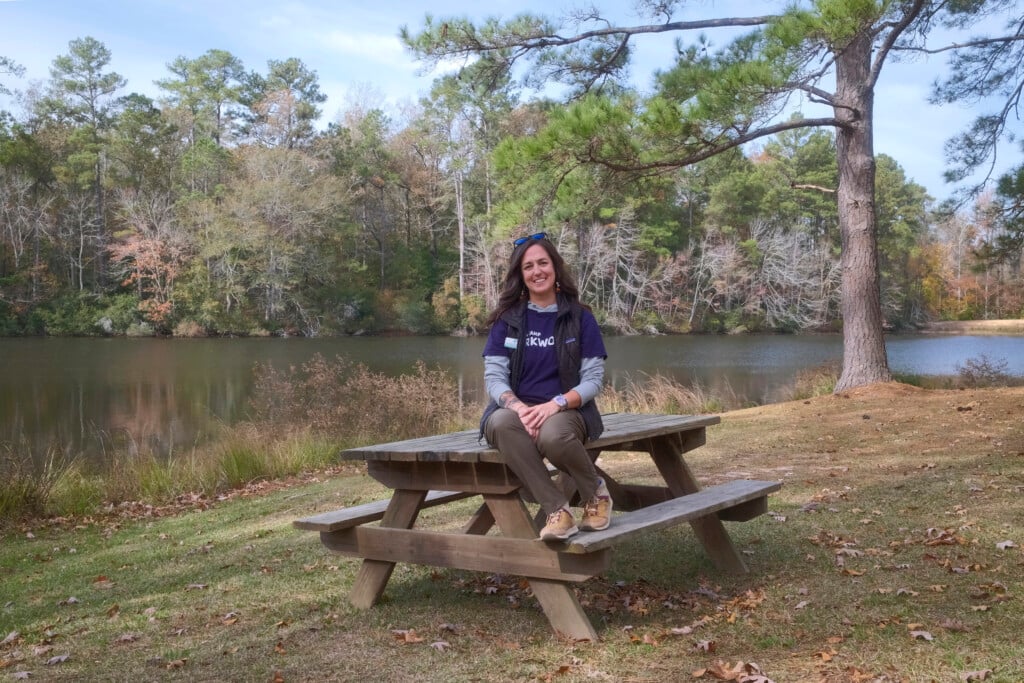Branching Out
Isabelle Shepherd takes helm at Alliance for Cape Fear Trees
ISABELLE SHEPHERD’s deep connection with nature is a passion she’s carried since her childhood in rural West Virginia. A sense of place has always been central to her identity, and this connection led her to a role where she champions the importance of trees in the Cape Fear region.
“I grew up in a one-stoplight town where, if I walked out the back door, I could be climbing a mountain in the forest within two minutes,” Shepherd says.
It’s this natural environment that fostered her love for trees, and it’s this same love that drives her work as the executive director of the Alliance for Cape Fear Trees (ACFT). She accepted the nonprofit leadership role earlier this month.
Shepherd’s career path is as unique as her passion for trees. She earned a bachelor’s degree in English and political science from West Virginia University, and ten years ago, she moved to Wilmington to pursue an MFA in creative writing. It was during her time at the University of North Carolina Wilmington that Shepherd’s journey into the nonprofit sector began, first as a graduate fellow for WHQR Public Radio, where she immersed herself in local issues.
That experience eventually led her to work with StepUp Wilmington and the Historic Wilmington Foundation, where she honed her skills in development, grant writing, and community outreach.
But it was the opportunity to lead ACFT that truly resonated with Shepherd. “I was excited at the opportunity to serve in that executive leadership position,” she says. “ACFT has grown exponentially in the ten years since its founding in 2015, and there’s still so much more we can do to deepen our community ties and increase our impact.”
Shepherd aims to expand ACFT’s mission to not only plant trees but also ensure their survival.
She is particularly passionate about the Tree Stewards Program, which trains volunteers to plant, water mulch, stake, and prune trees, ensuring they establish strong roots and contribute to the urban canopy. “It’s one thing to plant trees,” she says, “but they need support, especially when they’re young.”
Shepherd emphasizes that trees are more than just part of the landscape; they are essential to human well-being. Studies show that urban forests can reduce crime, curb pollution, and promote better mental health.
“Green spaces suggest safety, and trees help create an environment where people feel at ease,” she says.
Shepherd’s work is also informed by her belief in the power of building relationships. She is dedicated to growing partnerships with local and governmental agencies and nonprofits that share ACFT’s mission. This approach has allowed her to make lasting connections in the community and expand the nonprofit’s reach.
Recently, ACFT’s advocacy has focused on the proximity of a proposed development near Sledge Forest, an old-growth forest in Castle Hayne. Though the project would not involve large-scale clear cutting of the floodplain forest, the group is concerned about the potential ecological impacts due to the proposed development of the adjoining uplands region.
“I enjoy breaking down wonky policy and academic research into something that’s understandable and actionable for the community,” Shepherd says.
Wilmington residents, Shepherd says, can contribute to the natural beauty around them.
“Now is the time to plant trees,” she advises. “Planting season runs from October to February, and trees planted now get a valuable head start before the heat of summer.”
With proper care, those trees will thrive and provide benefits for generations to come.
Shepherd’s personal connection to trees runs deep.
“If I could be a tree, I’d be a black walnut,” she says, remembering the walnut tree in her father’s yard, whose fruits perfumed her childhood. “Black walnuts are long-lived and leave a legacy through their timber and nuts.”
Likewise, Shepherd hopes to leave a lasting impact on the Lower Cape Fear region – one where the trees are valued, preserved, and protected for future generations.
To view more of photographer Aris Harding’s work, go to arisharding.com.
Want more WILMA? Click here to sign up for our WILMA newsletters and announcements.




